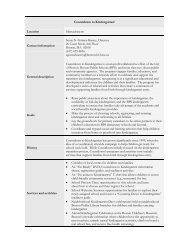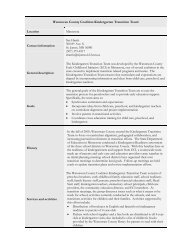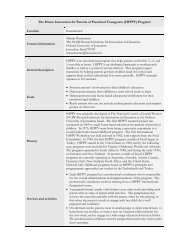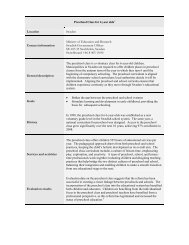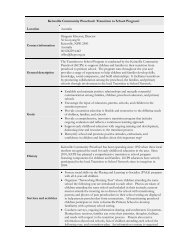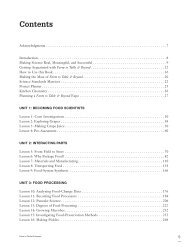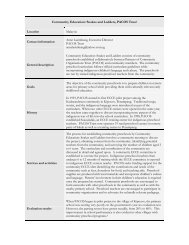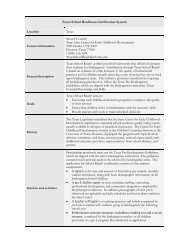Proceedings of the Fourth Annual Teachers College Educational ...
Proceedings of the Fourth Annual Teachers College Educational ...
Proceedings of the Fourth Annual Teachers College Educational ...
You also want an ePaper? Increase the reach of your titles
YUMPU automatically turns print PDFs into web optimized ePapers that Google loves.
can create interventions to encourage reflection but practices and <strong>the</strong>refore PLEs cannot be simply taken<br />
over.<br />
This research is interested in developing environments and interventions, which foster students not only<br />
to adopt but ra<strong>the</strong>r to co-produce and refine diverse knowledge practices. The aim is to allow critical<br />
reviewing <strong>of</strong> negotiated practices as well as encouraging students to take over responsibility in such<br />
processes. Accordingly, this research aims to enable students to transform <strong>the</strong>ir own PLE.<br />
The underlying assumptions can be stated as follows:<br />
• Actual teaching and learning situations (in higher education) are affected significantly by personal<br />
learning environments and incorporated knowledge practices.<br />
• PLEs as activity systems are helpful for students to articulate knowledge practices.<br />
The study takes place in two seminar settings in higher education: The intention <strong>of</strong> <strong>the</strong> first seminar is to<br />
facilitate divergent thinking and to encourage students to generate questions. The second seminar aims<br />
to establish <strong>the</strong> inquiry-based concept development. The teacher assumes that students have to<br />
transform <strong>the</strong>ir existing practices and adapt <strong>the</strong>ir PLEs to dissolve <strong>the</strong> given assignments. The<br />
development <strong>of</strong> PLEs is not an explicit learning goal but it ra<strong>the</strong>r serves as a vehicle/instrument to<br />
explicate <strong>the</strong> knowledge practices.<br />
A mixed-method approach <strong>of</strong> qualitative methods (Cultural Probes, activity systems analysis,<br />
conversation analysis, interviews, artifact analysis) will be used to gain a deeper understanding <strong>of</strong> <strong>the</strong>se<br />
negotiations to identify implicit and explicit incorporated practices <strong>of</strong> students, and how responsibility is<br />
developed in <strong>the</strong>se processes. Students will also contribute as co-researchers by working on exploration<br />
tasks to collect contextual information.<br />
In summery <strong>the</strong> aim <strong>of</strong> <strong>the</strong> dissertation is to develop interventions which engages students to develop<br />
diverse knowledge practices and with it an emergent PLE.<br />
References<br />
Buchem, I., Attwell, G., & Torres, R. (2011). Understanding Personal Learning Environments: Literature<br />
review and syn<strong>the</strong>sis through <strong>the</strong> Activity Theory lens. In <strong>Proceedings</strong> <strong>of</strong> <strong>the</strong> The PLE Conference<br />
2011 (pp. 1–33). Retrieved from http://journal.webscience.org/658/1/<br />
PLE_SOU_Paper_Buchem_Attwell_Torress.doc<br />
Drucker, P. F. (1999). Knowledge-Worker Productivity: The Biggest Challenge. California Management<br />
Review, 41(2), p 79-94. Retrieved from http://www.jstor.org/stable/41165987<br />
Engeström, Y. (2007). Activity <strong>the</strong>ory and individual and social transformation. In Y. Engeström, R.<br />
Miettinen, & R.-L. Punamäki (Eds.), Perspectives on activity <strong>the</strong>ory (pp. 19–38). Cambridge:<br />
Cambridge University Press.<br />
Hakkarainen, K. (2009). A knowledge-practice perspective on technology-mediated learning. International<br />
Journal <strong>of</strong> Computer-Supported Collaborative Learning, 4(2), 213–231. doi:10.1007/s11412-009-<br />
9064-x<br />
Orlikowski, W. J. (2007). Sociomaterial Practices: Exploring Technology at Work. Organization Studies,<br />
28(9), 1435–1448. doi:10.1177/0170840607081138<br />
Reisas, S., Schaller, R., Allert, H., Richter, C., & Lehmhaus, F. W. (2011). Exploration der Lernsituation<br />
von Studierenden mit Cultural Probes. Zeitschrift für Hochschulentwicklung, 6(2), 78–92.<br />
Retrieved from http://www.zfhe.at/index.php/zfhe/article/view/230<br />
Wenger, E. (2008). Communities <strong>of</strong> practice: Learning, meaning, and identity (16th ed.). Learning in<br />
doing. Cambridge: Cambridge Univ. Press.<br />
Yamagata-Lynch, L. C. (2010). Activity systems analysis methods: Understanding complex learning<br />
environments. New York ;, London: Springer.<br />
55



